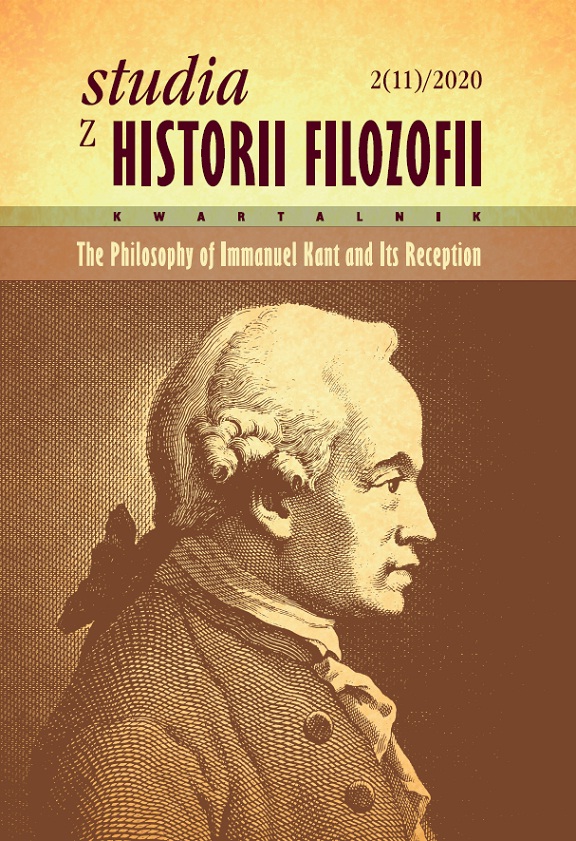Die soziologische Rezeption von Kants Anthropologie im 20. Jahrhundert: Probleme und Beispiele
DOI:
https://doi.org/10.12775/szhf.2020.014Słowa kluczowe
Kant, anthropology, Mead, Plessner, AlbertAbstrakt
The paper examines the mostly neglected social aspects of Kant’s anthropology, as a foreword to the discussion concerning the influence and the actuality of Kant’s anthropology from the modern perspective of social sciences, and sociology in par ticular. Its first part, containing a brief description of the structure of Kant’s pragmatic anthropology, analyzes its social elements, with an emphasis on the anthropological role of the concept of ‘unsocial sociability’. In the second part, I shed light on the main factors which so far have been a major impediment to a wider sociological reception of Kant’s ideas. In the third part, I address the question of Kant’s influence on the European and American sociology – on the examples of George H. Mead’s pragmatism, Hans Albert’ critical rationalism and philosophical anthropology of Helmuth Plessner.
Bibliografia
Albert Hans. 1968. Traktat über Kritische Vernunft. Tübingen: Mohr.
Albert Hans. 1977. Kritische Vernunft und menschliche Praxis. Stuttgart: Reclam.
Albert Hans. 1982. Die Wissenschaft und die Fehlbarkeit der Vernunft. Tübingen: Mohr.
Albert Hans. 1986. Freiheit und Ordnung. Zwei Abhandlungen zum Problem einer offenen Gesellschaft. Tübingen: Mohr.
Bernasconi Robert. 2002. “Kant as an Unfamiliar Source of Racism”. In: Philosophers on Race. Ed. T. Lott, J. Ward. 145–166. Oxford: Blackwell Publishing.
Brandt Reinhardt, Werner Stark. 1997. “Einleitung”. In: Immanuel Kant. Gesammelte Schriften. Akademie-Ausgabe. Bd. XXV: Vorlesungen über Anthropologie, VII–CLI. Berlin: De Gruyter.
Brunkhorst Hauke. 2008. “Die Kommunikative Wende der Soziologie. Jürgen Habermas im Kontext der Nachkriegssoziologie”. In: Das Feld der Frankfurter Kultur und Sozialwissenschaften nach 1945. Ed. R. Faber. 167–188. Würzburg: Königshausen & Neumann.
Cohen Alix. 2009. Kant and the Human Sciences: Biology, Anthropology and History. New York: Palgrave Macmillan.
Dahrendorf Ralf. 1967. Pfade aus Utopia: Arbeiten zur Theorie und Methode der Soziologie. München: Piper.
Dahrendorf Ralf. 1972. Konflikt und Freiheit: auf dem Weg zur Dienstklassengesellschaft. München: Piper.
Foucault Michel. 2008. Anthropologie du point de vue pragmatique. Introduction a l’Anthropologie [1964]. Paris: Vrin.
Frierson Patrick J. 2003. Freedom and Anthropology in Kant’s Moral Philosophy. Cambridge: Cambridge University Press.
Gilroy Paul. 2000. Against Race: Imagining Political Culture Beyond the Color Line. Cambridge: Belknap Press.
Guyer Paul. 2015. “Play and Society in Kant’s Anthropology”. In: Reading Kant’s Lectures, ed. R. R. Clewis. 223–241. Berlin/Boston: De Gruyter.
Hanna Robert. 2006. Kant, Science, and Human Nature. Oxford/New York: Oxford University Press.
Hart Keith. 2010. “Kant, ‘anthropology’ and the new human universal”. Social Anthropology/Anthropologie Sociale 18, 4: 441–447.
Honneth Axel. 1992. Kampf um Anerkennung. Frankfurt a.M.: Suhrkamp Verlag.
Joas Hans. 1989. Praktische Intersubjektivität: Die Entwicklung des Werkes von George Herbert Mead. Frankfurt a.M.: Suhrkamp.
Jonas Friedrich. 1981. Geschichte der Soziologie. Bd. 1: Aufklärung, Liberalismus, Idealismus. 2. Aufl. Opladen: Westdeutscher Verlag.
Kant Immanuel. 1900–. Gesammelte Schriften. Akademie-Ausgabe. Berlin.
Kleingeld Pauline. 2014. “Kant’s Second Thoughts on Colonialism”. In: Kant and Colonialism: Historical and Critical Perspectives. Ed. K. Flikschuh, L. Ypi. 43–67. Oxford: Oxford University Press.
Lindemann Gesa. 2002. Die Grenzen des Sozialen: Zur sozio-technischen Konstruktion von Leben und Tod in der Intensivmedizin. München: Wilhelm Fink.
Louden Robert B. 2000. Kant’s Impure Ethics: From Rational Beings to Human Beings. New York: Oxford University Press.
Lührs Georg, Thilo Sarrazin, Frithjof Spreer, Manfred Tietzel. 1975. “Kritischer Rationalismus und Sozialdemokratie”. In: Kritischer Rationalismus und Sozialdemokratie. Ed. G. Lührs, T. Sarrazin, F. Spreer, M. Tietzel. 1–54. Berlin/Bonn/Bad Godesberg: Dietz Verlag.
Mead George H. 1918. “The Psychology of Punitive Justice”. American Journal of Sociology 23: 577–602.
Mead George H. 1980. Gesammelte Aufsätze. Bd. 1. Ed. Hans Joas. Frankfurt a.M.: Suhrkamp.
Peirce Charles S. 1934. Collected Papers. Vol. 5. Ed. C. Hartshorne, P. Weiss. Cambridge: Harvard University Press.
Plessner Helmuth. 1983. “Ungesellige Geselligkeit. Anmerkungen zu einem Kantischen Begriff [1966]”. In: Helmuth Plessner, Gesammelte Schriften. Bd. VIII: Conditio humana. 294–306. Frankfurt a.M.: Suhrkamp.
Popper Karl. 1996. “Immanuel Kant: the Philosopher of the Enlightenment”. In: In Search of a Better World: Lectures and Essays from Thirty Years. 126–136. London/New York: Routledge.
Rossi Philip J. 2013. “Cosmopolitanism – Kant’s Social Anthropology of Hope”. In: Kant und die Philosophie in weltbürgerlicher Absicht: Akten des XI. Kant-Kongresses 2010. Bd. 4. Ed. S. Bacin, A. Ferrarin, C. La Rocca, M. Ruffing. 827–837. Berlin: De Gruyter.
Schäfers Bernhard. 1996. “Kant und die Entwicklung einer aufgeklärten Erkenntnistheorie und Sozialwissenschaft”. In: Bernhard Schäfers. Soziologie und Gesellschaftsentwicklung: Aufsätze 1966–1996. 22–43. Wiesbaden: Springer.
Schmitt Jürgen. 2000. Die Grenzen der Rational Choice Theorie. Wiesbaden: Springer.
Stark Werner. 2000. “‘Diese Dinge’ und andere Varia”. In: Zustand und Zukunft der Akademie-Ausgabe von Kant‘s gesammelten Schriften. Kant-Studien. Bd. 91. Sonderheft. Ed. R. Brandt, W. Stark. 1–16. Berlin: De Gruyter.
Sturm Thomas. 2009. Kant und die Wissenschaften vom Menschen. Paderborn: Mentis Verlag.
Sturm Thomas. 2017. “Reines und empirisches Bewusstsein in Kants Anthropologie: Das ‘Ich’ und die rationale Charakterentwicklung”. In: Immanuel Kant – Die Einheit des Bewusstseins. Ed. G. Motta, U. Thiel. 195–220. Berlin/Boston: De Gruyter.
Waldenfels Bernhard. 2015. “Das Dilemma einer ungeselligen Geselligkeit”. In: Bernhard Waldenfels. Sozialität und Alterität: Modi sozialer Erfahrung. 29–72. Berlin: Suhrkamp.
Willaschek Marcus. 2015. “Kant and Peirce on Belief ”. In: Pragmatism, Kant and Transcendental Philosophy. Ed. G. Gava, R. Stern. 133–151. New York: Routledge.
Wilson Holly J. 2006. Kant’s Pragmatic Anthropology: Its Origin, Meaning and Critic Significance. New York: SUNY Press.
Wood Allen. 1991. “Unsocial Sociability: The Anthropological Basis of Kantian Ethics”. Philosophical Topics 19: 325–351.
Wood Allen. 2003. “Kant and the Problem of Human Nature”. In: Essays on Kant’s Anthropology. Ed. B. Jacobs, P. Kain. 38–59. Cambridge: Cambridge University Press.
Zhavoronkov Alexey, Alexey Salikov. 2018. “The Concept of Race in Kant’s Lectures on Anthropology”. Con-Textos Kantianos 7: 275–292.
Zöller Günter. 2011. “Kant’s Political Anthropology”. Kant Yearbook 3: 131–161.
Pobrania
Opublikowane
Jak cytować
Numer
Dział
Statystyki
Liczba wyświetleń i pobrań: 959
Liczba cytowań: 0



